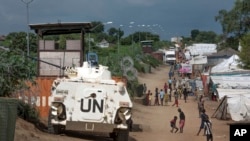South Sudan, which gained its independence from Sudan in 2011, has, for most of its existence, confronted a variety of humanitarian challenges. Twenty years of north-south conflict, poverty, and continued tension with Sudan, which included a cessation of oil exports in 2012 that wrecked South Sudan’s economy, have destabilized and weakened the country and government.
As a result, the South Sudanese government was not able to effectively respond to internal problems and natural disasters. Furthermore, floods, droughts, and more than seven years of armed internal conflict disrupted farming and pastoral activities, markets, and trade, exacerbating food insecurity and humanitarian needs.
Today, South Sudan is largely dependent on the humanitarian community for food, infrastructure, and peacekeeping, including the prevention of and response to gender based violence.
Of South Sudan’s population of 12 million people, some 8.3 million or 70 percent, will need humanitarian or emergency food assistance in 2021, according to the United Nations.
However, “South Sudan is perennially one of the most dangerous countries for aid workers to operate in,” said USAID Administrator Samantha Power in a recent statement. “Since the beginning of 2020, there have been more than 400 violent incidents against aid workers, according to the United Nations.” This includes the killing of two aid workers in May 2021.
“The United States condemns this violence and calls on the Government of South Sudan to protect civilians and humanitarians and to arrest the perpetrators in Renk, Torit, and Jamjang and hold them accountable,” said Administrator Power.
“Violence against aid organizations not only puts aid workers’ lives at risk; it disrupts the flow of life-saving aid to those in need. Recent attacks have forced some organizations to suspend humanitarian assistance in Unity and Upper Nile states, which are nearing famine conditions, meaning that approximately 45,000 people could lose access to the aid they desperately need,” she said.
“Our humanitarian partners work tirelessly and at great personal risk to deliver assistance. Maintaining their safety and unhindered access to people in need is critical to keeping people alive.Attacks, intimidation, or threats against aid workers, regardless of nationality, are unacceptable.
“The Government of South Sudan must take immediate and effective measures to protect humanitarian workers and provide sustained and unhindered access to those who are experiencing food insecurity and other acute humanitarian needs.”














